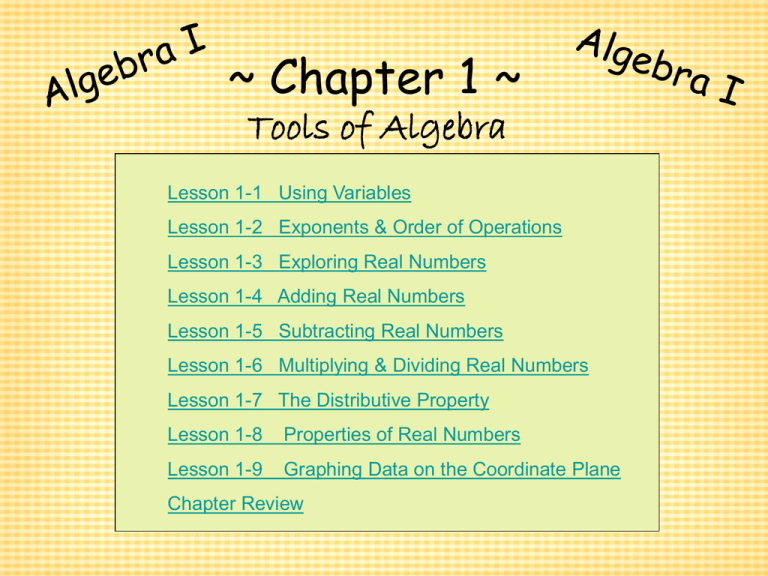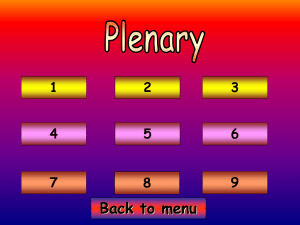Chapter 1
advertisement

~ Chapter 1 ~ Tools of Algebra Lesson 1-1 Using Variables Lesson 1-2 Exponents & Order of Operations Lesson 1-3 Exploring Real Numbers Lesson 1-4 Adding Real Numbers Lesson 1-5 Subtracting Real Numbers Lesson 1-6 Multiplying & Dividing Real Numbers Lesson 1-7 The Distributive Property Lesson 1-8 Properties of Real Numbers Lesson 1-9 Graphing Data on the Coordinate Plane Chapter Review Using Variables Chap 1 Diagnosing Readiness Answers Main Menu Using Variables Notes Variable – a symbol that represents one or more numbers. Examples – x, y, q, r, s, n … Algebraic Expression – a mathematical phrase that can include numbers, variable, and operation symbols. (no equal sign) Examples ~ 2n , 4+8 , n , 27x – 4y … 9 Main Menu Using Variables Using Variables Notes Notes Writing an Algebraic Expression Add – Terms -> sum, altogether, more than, greater than, greater than…than… Subtract – terms -> difference, minus, less than… Multiply – terms -> product, times, multiplied by, twice, triple… Divide – terms -> quotient, divided by, half, third… Main Menu Using Variables Notes Examples: Five more than a number n+5 The difference of five and a number 5-x Five less than x x-5 The product of five and a number 5n The quotient of a number and five n÷5 Main Menu Using Variables Notes More complex algebraic expressions: (1)Two times a number plus five 2n + 5 (2)Seven less than five times a number 5x - 7 (3)Four more than the quotient of a number and six (n ÷ 6) + 4 Main Menu Using Variables Notes Equation – a mathematical sentence that uses an equal sign. (Ex: 2+3 = 5, 4x=8,…) Open sentence – an equation that contains one or more variables. (Ex: 2x=8, 3x+2y = 10) Writing an Equation Track One Media sells all CD’s for $12 each. Write an equation for the total cost of a given number of CD’s. Know: The total cost is 12 times the number of CD’s Define: Let n = of CD’s Let c = total cost Write: c = 12n or 12n = c Main Menu Using Variables Notes Number of Hours 4 6 8 10 Total Pay $32 $48 $64 $80 Know: Number of hours times 8 equals the total pay Define: Let n = number of hours Let t = total pay Write: 8n = t or t = 8n Main Menu Using Variables Notes – Practice Problems the quotient of 6.3 and b 6.3 ÷ b s minus ten s - 10 9 less than a number n-9 The sum of twice a number and thirty-one 2x + 31 The product of one half of a number and one fourth of the same number ½ n ( ¼ n) Main Menu Using Variables Homework Main Menu Exponents & Order of Operations Daily Math Review Main Menu Using Variables Homework - Answers ?????? Questions ??????? Main Menu Exponents & Order of Operations Notes Simplify – replace an expression with its simplest name or form. Exponents – A number that shows repeated multiplication. (In 24 ~ 4 is the exponent) Base – The number that is multiplied repeatedly in a power. (In 24 ~ 2 is the base) Power – has two parts, a base and an exponent, and has the form an. Order of operations – GEMS – (1) grouping symbols; (2) Exponents; (3) Multiply & Divide (left to right) (4) Subtract & Add (left to right) Main Menu Exponents & Order of Operations Notes Simplifying a Numerical Expression 3 2 4 1 18 25 – 8 * 2 + 32 3 2 4 1 18 14 + 2 * 4 – 22 2 3 1 5 3+5–6÷2 2 1 6 – 10 ÷ 5 4 Main Menu Exponents & Order of Operations Notes Evaluating an Algebraic Expression 3a – 23 ÷ b 2 for a = 7 and b = 4 4 1 3 3 * 7 – 23 ÷ 4 19 Example: A shirt costs $22.85 plus sales tax. What is the total cost of the shirt? Expression - p + p * r ( p = price; r = tax) c = $22.85 + $22.85(0.07) = $22.85 + $1.5995 = c = $24.45 Main Menu Exponents & Order of Operations Practice 3 * 6 – 42 ÷ 2 4 * 7 + 4 ÷ 22 53 + 90 ÷ 10 Evaluate the following for c = 2 and d = 5 4c – 2d ÷ c 3 c4 – d * 2 6 d + 6c ÷ 4 8 40 – d2 + cd * 3 45 Main Menu Exponents & Order of Operations Notes Expressions with parenthesis 15(13 – 7) ÷ (8 - 5) (5 + 3) ÷ 2 + (52 – 3) 15(6) ÷ (3) (8) ÷ 2 + (25 – 3) 90 ÷ 3 4 + 22 30 26 Expressions with Exponents (cd)2 for c = 7 & d = 19 (7 * 19)2 (133)2 = 17,689 Main Menu Exponents & Order of Operations Notes m2n for m=5&n=4 52 * 4 = 25 * 4 = 100 Evaluate the following for m=3, q=4, p=7 qp2 + q2p m(pq)2 4*72 + 42*7 3(7*4)2 4*49 + 16*7 3(28)2 196 + 112 = 308 3(784) = 2,352 Simplifying an expression 2[(13-7)2 ÷3] 24 Main Menu Exponents & Order of Operations Practice 5[4 + 3(22+1)] 28 ÷ [(19 -7) ÷ 3] 5[4 + 3(4+1)] 28 ÷ [(12) ÷ 3] 5[4 + 3(5)] 28 ÷ [4] = 7 5[4 + 15] 5[19] = 95 9 + [4 – (10 – 9)2]3 9 + [4 – (1)2]3 9 + [4 – 1]3 9 + [3]3 9 + 27 = 36 Main Menu Exponents & Order of Operations Homework Main Menu Exploring Real Numbers Daily Math Review Main Menu Exponents & Order of Operations Homework - Answers ?????? Questions ??????? ?????? Questions ??????? Main Menu Exploring Real Numbers Notes Natural Numbers – counting numbers ~ 1, 2, 3… (not 0) Whole Numbers – non-negative integers ~ 0, 1, 2, 3, 4… Integers – whole #’s & their opposites ~ …-2, -1,0,1,2… Rational Numbers – numbers that can be written as a/b where b ≠ 0. Decimal form is a terminating or repeating decimal. Irrational Numbers – numbers that cannot be expressed in the form a/b where a & b are integers. (Ex ~ π, √10, 0.101001000…) Classify the following -12 -4.67 integer, rational number 5 natural number, whole number, integer, rational number rational number 5/12 rational number Main Menu Exploring Real Numbers Notes Counterexample – Any example that proves a statement false… (a) All Whole numbers are rational numbers T or F (b) All integers are whole numbers. T or F (c) The square of a number is always greater than the number. T or F (d) All whole numbers are integers. T or F (e) No fractions are whole numbers. T or F Inequality (>, <, ≥ , ≤ , ≠ ~ used to compare the value of two expressions) Ordering fractions (1) Write fractions as a decimal and then compare (2) Find the common denominator, convert, and then compare Absolute value – distance a number is from 0. l-19l = 19 l22l = 22 Main Menu Adding Real Numbers Notes Identity Property of Addition - n + 0 = n, for every real number n. Inverse Property of Addition – n + (-n) = 0 (additive inverse is the opposite of a number) Rules for Adding •Numbers with the same signs – add and keep the sign. •Numbers with different signs – subtract, answer takes the sign of the number with the greatest absolute value. Examples -7 + (-4) -26.3 + 8.9 -11 -17.4 -3/4 + (-1/2) 8/9 + (-5/6) -1 ¼ 1/18 Main Menu Adding & Subtracting Real Numbers Notes Evaluating Expressions -n + 8.9 for n = -2.3 t + (-4.3) for t = -7.1 11.2 -11.4 Matrix 29.3 3.1 14.6 1.2 12.1 3.3 + -3 -3.9 -4 2 2.7 -5 Subtracting Real Numbers Leave, change, opposite… (then use the rules for addition) 3 – 5 = 3 + (-5) = -2 ¾ - (-11/12) = 3-(-5) = 3 + 5 = 8 Main Menu Subtracting Real Numbers Notes Absolute Values l 5-11 l = l7–8l= Evaluating Expressions -a – b for a = -3 & b = -5 -(-3) – (-5) =3+5=8 Subtract with Matrices -3 4 0 -1 _ -5 -6 -9 -4 Main Menu Real Numbers Homework Practice 1-3 - every 3rd problem Practice 1-4 – every 3rd problem Practice 1-5 – every 3rd problem & #35 Main Menu Adding Real Numbers Daily Math Review Main Menu Real Numbers Homework - Answers Main Menu Real Numbers Homework - Answers ?????? Questions ??????? Main Menu Multiplying & Dividing Real Numbers Notes Identity Property of Multiplication ~ 1 * n = n Multiplication Property of Zero ~ n * 0 = 0 Multiplication Property of -1 ~ -1 * n = -n Rules for Multiplying & Dividing (1) Like/same signs – answer is positive. (2) Different signs – answer is negative. Simplifying Expressions -6 * -5 = -2( -15/3) = 30 -43 -(4*4*4) -64 -2.7 * 4.1 = 10 (-2)4 -11.07 -(3/4)2 (-2)(-2)(-2)(-2) 16 -( ¾ * ¾) -9/16 Main Menu Multiplying & Dividing Real Numbers Notes Evaluating Expressions -(cd) (-2)(-3)(cd) -(-8*(-7)) for c= -8 and d= -7 (-2)(-3)(-8*(-7)) -56 336 3x ÷ 2z + y ÷ 10 2z+x/2y 3(8) ÷ 2(-3) + (-5) ÷ 10 [2(-3) + (8)]/2(-5) 24 ÷ (-6) + (-5/10) [-6 + 8]/-10 -4 + (-1/2) 2/-10 -4 ½ for x = 8, y = -5, & z = -3 - 1/5 Inverse Property of Multiplication ~ a ≠ 0, a (1/a) = 1 x/y x = -3/4 and y = -5/2 -3/4 ÷ (-5/2) (the reciprocal or multiplicative inverse is used) -3/4 x (-2/5) = 6/20 = 3/10 Main Menu Properties of Real Numbers Notes Main Menu The Distributive Property Notes Distributive Property ~ a(b + c) = ab + ac; (b + c)a = ba + ca a(b – c) = ab – ac; (b – c)a = ba – ca Simplifying Expressions 13(103) = 13(100 + 3) 24(98) = = 13(100) + 13(3) = 1300 + 39 = 1339 6(m + 5) 2(3-7t) (0.4 + 1.1c)(3) 6m + 30 6 – 14t 1.2 + 3.3c Terms, constants, and coefficients… 6a2 – 5ab + 3b – 12 (a2, ab, and b are all unlike terms) Like terms are combined to simplify an expression… 3x2 + 5x2 7y + 6y -9w3 - 3w3 Main Menu Multiplying & Dividing Real Number & The Distributive Property Notes & Homework Writing an Expression… -2 times the quantity t plus 7 -2(t + 7) The product of 14 and the quantity 8 plus w 14(8 + w) Main Menu Properties of Real Numbers Notes Commutative Property of Addition ~ a + b = b + a Commutative Property of Multiplication ~ a * b = b * a Associative Property of Addition ~ (a + b) + c = a + (b + c) Associative Property of Multiplication ~ (a * b) * c = a * (b * c) Identity Property of Addition ~ a + 0 = a Identity Property of Multiplication ~ a*1=a Inverse Property of Addition ~ a + (-a) = 0 Inverse Property of Multiplication ~ a (1/a) = 1 Distributive Property Multiplication Property of Zero Multiplication Property of -1 Identify the property… 9+7 = 7+9 1m = m np = pn 2+0=2 Main Menu Properties of Real Numbers Notes Using Deductive Reasoning – logically justifying the reason (the why) for each step in simplifying an expression using properties, definitions, or rules. Simplify the expression… Justify each step 7z – 5(3 + z) Step Reason 7z – 15 - 5z Distributive Property 7z +(-15) + (-5z) Rules for subtraction 7z + (-5z) + (-15) Commutative property of addition 2z + (-15) addition of like terms 2z – 15 rules for subtraction Main Menu Properties of Real Numbers & Graphing on the Coordinate Plane Notes 2(3t – 1) + 2 Step Reason 6t – 2 + 2 Distributive property 6t +(-2) + 2 Rules/defn of subtraction 6t addition Homework Practice 1-7 & 1-8 even;-) Main Menu Subtracting Real Numbers Quiz Lesson 1-1 to 1-4 Main Menu Properties of Real Numbers Notes Main Menu Properties of Real Numbers & Graphing on the Coordinate Plane Homework Answers Main Menu Graphing on the Coordinate Plane Notes Graphing Data on the Coordinate Plane A coordinate plane has an x-axis (horizontal) and a y-axis (vertical) An ordered pair (x, y) are the numbers that identify the specific location of a point. (0,0) origin (-,+) Quadrant II Quadrant III (-,-) y-axis (+,+) Quadrant I x-axis Quadrant IV (+,-) Main Menu Properties of Real Numbers & Graphing on the Coordinate Plane Identifying & Graphing Points Notes Use the (x, y) location to identify the location of a point. Graph C(0,3); Quadrant? (-2,0) D (2,4); (4,-1) E(-1,-4); (-3,-5) F(-3,0) (2.7,3.6) Can we find the dimensions of a shape when we graph it? Scatter Plot Graph that relates data of two different sets. Scattered points do not form a line. (Usually graphed in Quadrant I) A trend line can show trend of the data in a scatter plot. Main Menu Properties of Real Numbers & Graphing on the Coordinate Plane Practice Homework Practice 1-8 & 1-9 odd Main Menu Properties of Real Numbers & Graphing on the Coordinate Plane Homework Answers Main Menu Daily Math Review Main Menu ~ Chapter 1 ~ Chapter Review Main Menu ~ Chapter 1 ~ Chapter Review Main Menu



